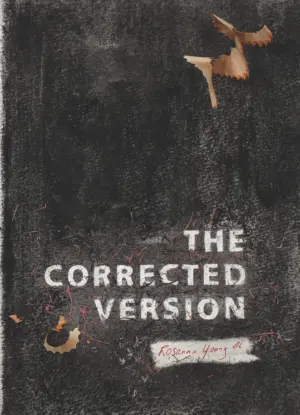The Corrected Version
by Rosanna Young Oh
reviewed by Celeste Chen
Rosanna Young Oh’s debut collection, The Corrected Version, explores the shifting ways that myths allow us to understand lived experiences. Early in the collection, in “The Problem with Myth,” Oh presents different versions of a Korean myth:
In the story my mother tells,
the angel never returned to heaven –
the woodcutter stole her cloak of wings while she bathed by the mangroves
and took her as she shuddered in the wilderness.
Oh’s father, on the other hand, narrates “the corrected version”:
the angel was to blame.
The woodcutter was seduced, moonstruck.. . . . . . . . . . . . . . . . . . . . . . . . . . . . . . . . . . . .
Beauty justified the coveting.
Throughout The Corrected Version, Oh ruminates on the idea of correctness. In “Homework,” the first poem in the collection, Oh responds to an assignment which is ostensibly a question about her life at home:
I stay behind the register to bag
the groceries. My dad wakes up at one
to buy fish in the Bronx. Sometimes I gag
if he smells bad. When Mom’s store chores are done,
her hands feel rough from rose thorns and steel wool.
While Oh’s teacher approves of her “concreteness,” the answer elicits laughter from a classmate—whether or not Oh’s answer is “correct” is immaterial. The Corrected Version excels at this double-edged play, wherein a story can move one person yet fall flat for another. This is especially true of Oh’s father. In “Erasures,” Oh wonders why her father’s favorite story is that of Odysseus:
I suppose it might be
The prospect of uncertainty the waters offer
while the hero, circling and circling
the desolate isles, lives at the mercy of a god.. . . . . . . . . . . . . . . . . . . . . . . . . . . . . . . . . . . .
I’d like to believe my father has chosen
to remember Odysseus’s homecoming.
Oh’s relationship with her father—how they see and feel for each other—is central to the collection. In “Picking Blueberries,” Oh’s father declares: “You were not meant for this kind of life.” In “The Gift,” a customer says to the speaker’s father, “Give this garbage to your children,” and places a ripe Haitian mango on the counter. Though Oh wants to eat it—“I wanted to eat what the customer said was mine”—her father does not allow it. Later, Oh finds her father eating the mango by himself, and rather than begrudge him, she writes:
Sit down, I wanted to tell him,
Sit down. Here’s a milk crate. There’s no rush.
Eat and eat and eat. Sit down, sit down.
Let yourself want to eat.
The Corrected Version’s longest poem, “Hard Labor,” offers a harrowing picture of COVID-19 as experienced by the people who came to be known as “essential workers.” In the poem, Oh depicts the realities of her father’s profession: “The bald truth was that my father first saw / the coronavirus as a blessing. / The grocery had never been busier.” She does not flinch from these details even when her father falls ill:
Like a star, he has cooled into an idea.
I cannot recall his body or trace
The shape of his suffering.What I need is certainty:
How many liters of nasal cannula?
What percent oxygenation saturation?
The second half of the collection explores Oh’s adulthood. In “At the Bathhouses,” Oh’s mother scrubs her body so that Oh can “glow so bright, no one will know / I am a grocer’s daughter.” In “Two Bulls Fighting,” Oh and her father visit a gallery; before the titular painting, Oh’s father reflects on how “Bulls fight because they are bulls,” whereas Oh thinks of reincarnation—of the bargaining that goes into it: “a bad person / turned into a horse, a bad horse into a monkey, / a bad monkey into a worm, / a good worm into a cow.”
The Corrected Version’s structure and pacing are striking, and the arrangement of the poems shapes their interpretation. While the poem “Creation Narrative” might be mistaken for a list of foods, within the context of the collection, it turns into a picture of Oh’s family grocery store—of days spent stocking its shelves and cataloguing its items, of viewing foods not only as sustenance but as a means of survival:
Yukon Gold,
Goldrush,
Trail mix,
Mandarin,
Man –
Clementine,
Jasmine
With sensitive and deliberate grace, the collection presents a haunting portrait of Oh the poet, Oh the Korean American, and Oh the grocer’s daughter. Knitting work, love, family, duty, myth, and memory together, The Corrected Version digs into formative scenes from Oh’s life. What emerges is a collection of rich and expansive scope.
Published on November 2, 2023

